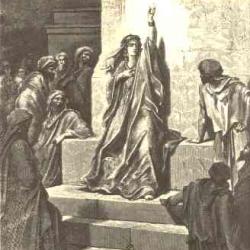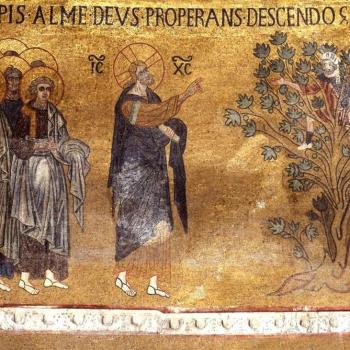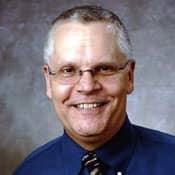On a spring morning in the early 1970s, I found myself in a suburban Maryland church, kneeling before the doughy cardinal Archbishop of Washington, Patrick O'Boyle, as he anointed my brow with chrism and then completed the gesture with something both bracing and bewildering.
He slapped me.
Actually, it was more of a determined tap. But it sealed the deal. It completed for me, dramatically, the sacrament of confirmation. I looked up into his puffy, expressionless face. There was nothing more to do, nothing to say. I swallowed, rose and returned to my pew. With that, I finished my sacraments of initiation into the Catholic Church. I was in.
Generations of Catholics came into the church that way, with a dab of oil and a sting of flesh. At the time, the Sisters of St. Joseph—no slouches in the slapping department, by the way—taught us that the touch of episcopal palm to young cheek was a harbinger of things to come. "It is a sign," they intoned, "of the sufferings we must endure as Christians." In other words: get used to it. There's more where that came from.
For an 11- or 12-year-old, it sounded ominous. And it made us look at our vocations as young Catholics with seriousness and a certain amount of dread. How long until we had to face the lions?
Flash forward forty years. Earlier this month, I was serving as deacon at our parish confirmation in Queens. The bishop anointed each of the kids as they came forward and then—I braced for the slap, waited for it—he extended a palm . . . and shook their hands. And he smiled as he did it.
He shook their hands?!
He could have been selling them a used car. The handshake in and of itself was harmless and benign, a congratulatory gesture that seemed to say, "Welcome to the club. And have a nice a day." But whatever else the newly confirmed may have experienced that day, I doubt it was anything approaching the gloomy sense of worry that gripped me all those years ago.
And that, I think, may be a problem.
I once jokingly said to my pastor, "Once they stopped slapping us, that was when things slid downhill." It sounded funny at the time. But as I think of it now—like that symbolic slap from long ago—that crack carries the sting of truth.
Somewhere along the way, the church lost a sense of severity, of seriousness. Of, well, sin. Our pulpits became lecterns, our pews became chairs, and a slap evolved into a handshake. We replaced "Come Holy Ghost" with "Whatsoever You Do," and decided to stand instead of kneel. The ominous chords of organs were replaced by the plucking strings of guitars. We designed our churches to have round corners and low altars. We scrapped the habits and unbuttoned the collars and made everything endearingly approachable and utterly bland.
What happened? I'm sure it seemed healthy and constructive at the time. But I can't escape the feeling that, in the midst of it all we surrendered something vital and valuable: we lost a sense of sacred awe.
We lost that sense of being a part of something greater than ourselves, something with weight and volume, something with shadow as well as light. Something that entailed suffering and hardship and the occasional stinging slap. As a result, we tend to take nothing as seriously anymore. Our sacraments have become sideshows. (Been to a baptism lately? A wedding? A First Communion or Confirmation? It ain't pretty. Tellingly, the priest who facilitated the confirmation in my parish ordered altar servers to stand watch. They blocked each of the four the aisles and kept parents with cameras from running up to take pictures during the ceremony. It kept some modicum of order. But the fact that it was even necessary is a sad commentary of the state of our sacraments.)
I realize I'm sounding (once again) like the insufferable old fart that I vowed never to become. But attention must be paid. Something is missing in our liturgies—and in our hearts. If we are to experience a renewal in our church, we need to renew, as well, our appreciation of wonder. We need to reclaim a sense of mystery. That includes, I think, a certain seriousness and austerity in our liturgy, in our sacraments, in our lives. We need to know that what we are undertaking is not just a thing of joy, but something more vast and more intimidating than anything we've ever encountered.
To be in church, to receive the sacraments, is to stand before the presence of God.
We need to be awestruck.
And maybe that includes, quite frankly, just being struck.
6/7/2011 4:00:00 AM





